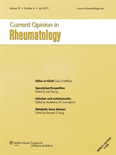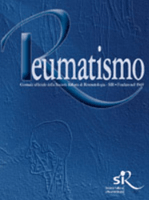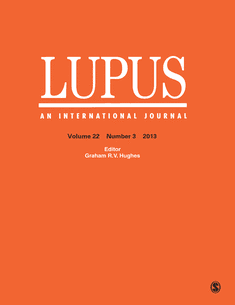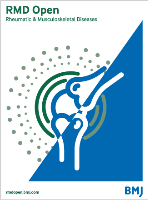
RHEUMATOLOGY INTERNATIONAL
Scope & Guideline
Innovating clinical approaches for better patient care.
Introduction
Aims and Scopes
- Clinical Research in Rheumatic Diseases:
The journal publishes original research focusing on the clinical aspects of rheumatic diseases, including diagnosis, treatment efficacy, and patient management strategies. - Pathophysiological Mechanisms:
Articles investigate the underlying biological and immunological mechanisms of rheumatic diseases, contributing to a deeper understanding of disease progression and potential therapeutic targets. - Innovative Treatments and Therapies:
Research on novel therapeutic approaches, including biologics and targeted therapies, is a core focus, highlighting advancements in treatment options for rheumatic conditions. - Patient-Centered Outcomes:
The journal prioritizes studies that assess patient-reported outcomes, quality of life, and psychosocial factors affecting individuals with rheumatic diseases. - Epidemiological Studies:
Epidemiological research examining the prevalence, incidence, and risk factors associated with rheumatic diseases is essential, providing insights into public health implications. - Telemedicine and Digital Health Innovations:
The integration of technology in rheumatology practice, including telehealth and digital health applications, is increasingly explored to enhance patient access and management.
Trending and Emerging
- Long-COVID and Autoimmunity:
Research into the implications of long-COVID on autoimmune conditions is gaining traction, exploring how COVID-19 may trigger or exacerbate rheumatic diseases. - Digital Health Solutions:
The rise of telemedicine and digital health applications in rheumatology has led to increased research on their effectiveness in managing chronic conditions and enhancing patient engagement. - Psychosocial Factors in Disease Management:
There is a growing emphasis on understanding the psychosocial aspects of living with rheumatic diseases, including mental health, quality of life, and the impact of social determinants on health. - Artificial Intelligence in Diagnosis and Treatment:
The application of artificial intelligence and machine learning in rheumatology, particularly for diagnostic accuracy and personalized treatment plans, is an emerging area of interest. - Comorbidities in Rheumatic Diseases:
Research focusing on the intersection of rheumatic diseases with other comorbid conditions, such as cardiovascular diseases and metabolic syndrome, is increasingly relevant. - Gender Differences in Rheumatology:
Emerging studies examining the impact of gender on the presentation, progression, and treatment outcomes of rheumatic diseases highlight the need for gender-sensitive approaches in care.
Declining or Waning
- Traditional Pharmacological Treatments:
Research focused solely on traditional pharmacological treatments, such as older non-steroidal anti-inflammatory drugs (NSAIDs), appears to be waning as the field shifts toward biologics and personalized medicine. - Basic Science without Clinical Relevance:
Studies that do not directly connect basic science findings to clinical applications are becoming less common, as there is a growing emphasis on translational research that impacts patient care. - Single-Center Studies:
The prevalence of single-center studies is declining in favor of multi-center collaborations and larger cohort studies, which provide more robust and generalizable findings. - Static Disease Models:
Research using static models of disease progression without considering dynamic changes in patient health and response to treatment is less favored, as there is increased recognition of the need for adaptive treatment strategies.
Similar Journals

CURRENT OPINION IN RHEUMATOLOGY
Advancing Knowledge in the Realm of RheumatologyCurrent Opinion in Rheumatology, published by Lippincott Williams & Wilkins, stands as a vital resource in the field of rheumatology. Since its inception in 1989, this prestigious journal has been at the forefront of disseminating cutting-edge research, with a notable Q1 ranking in the 2023 Rheumatology category and an impressive Scopus rank of 7 out of 73, placing it in the 91st percentile. The journal's commitment to presenting insightful reviews and critical analyses of recent advancements and treatment strategies makes it an essential read for professionals, researchers, and students dedicated to the study of rheumatic diseases. Although not an open-access journal, Current Opinion in Rheumatology continues to foster an informed dialogue within the academic community through its high-impact content, ensuring that the latest developments and practices are accessible to those at the vanguard of rheumatology research.

Reumatismo
Elevating understanding of rheumatic conditions through open access.Reumatismo is a distinguished Open Access journal dedicated to the field of rheumatology, published by PAGEPRESS PUBL since 2001. With a rich history dating back to 1952, this journal has been pivotal in disseminating vital research on rheumatic diseases and related disorders. Based in Italy, Reumatismo has earned a reputation for its quality and relevance, achieving a Q3 category ranking in the 2023 Scopus metrics for Rheumatology, reflecting its significant contributions to the field. The journal is committed to providing a platform for the latest scientific developments and clinical innovations, thus aiding researchers, healthcare professionals, and students striving to enhance understanding and treatment of rheumatic conditions. For those seeking to access comprehensive research articles and studies, Reumatismo boasts an open access policy, ensuring that knowledge is freely available to all, fostering collaboration and advancement in rheumatology worldwide.

LUPUS
Championing the fight against lupus with cutting-edge research.LUPUS is a premier peer-reviewed journal published by SAGE Publications Ltd, focusing on the field of rheumatology, with a specific emphasis on the complexities of lupus and related autoimmune disorders. Since its inception in 1991, the journal has consistently ranked in the Q2 category within the rheumatology field, currently positioned as #29 out of 73 in Scopus, reflecting its significant contributions to research and clinical practice. The journal aims to foster a deeper understanding of lupus through the publication of original research articles, reviews, and clinical studies, making it an essential resource for researchers, clinicians, and students dedicated to advancing knowledge in this vital area of medicine. With an impact factor that underscores its influence, LUPUS serves as a critical platform for sharing innovative findings and engaging discussions within the global scientific community. Although the journal follows a traditional access model, it is situated in the United Kingdom, at 1 Olivers Yard, 55 City Road, London EC1Y 1SP, England, and remains dedicated to supporting the continuous advancement of research in autoimmune diseases.

Gastrointestinal Disorders
Innovating Insights in Gastroenterology and BeyondGastrointestinal Disorders is a prominent open-access journal published by MDPI, based in Switzerland, that focuses on the latest research and innovations in the fields of gastroenterology, hepatology, and immunology. Since its inception in 2019, the journal has provided a vital platform for researchers and professionals to disseminate their findings, engaging with a global audience keen on advancing knowledge in gastrointestinal health. With a dedicated commitment to high-quality, peer-reviewed articles, Gastrointestinal Disorders has gained recognition in 2023, achieving Q3 status in gastroenterology and notable rankings in several other categories, including a respectable position in the quartiles for hepatology, immunology, and oncology. Despite its recent establishment, the journal has quickly become a valuable resource, facilitating open access to critical insights in the study of gastrointestinal diseases and their management, ensuring that emerging research is readily available to inform clinical practice and educate future professionals.

RMD Open
Transforming patient care through innovative research.RMD Open, published by the BMJ Publishing Group, is a leading open-access journal that has made significant contributions to the fields of Immunology, Immunology and Allergy, and Rheumatology since its inception in 2015. With an impressive Q1 ranking in these categories for 2023, the journal has established itself as an essential platform for the dissemination of high-quality research, case studies, and reviews that advance understanding and treatment strategies in these critical areas of health. As an open-access publication, RMD Open ensures that its content is freely accessible to a global audience, promoting collaboration and knowledge sharing among researchers, clinicians, and students. Based in the United Kingdom at the British Medical Association House, RMD Open is not only dedicated to improving patient care but also to fostering innovative research and discussions in the rapidly evolving landscape of rheumatic diseases.

Rheumatology Advances in Practice
Advancing knowledge, enhancing care in rheumatology.Rheumatology Advances in Practice, published by Oxford University Press, is a vital open-access journal dedicated to advancing research and education in the field of rheumatology. With an E-ISSN of 2514-1775 and an impressive open access model established since 2017, this journal facilitates the dissemination of cutting-edge knowledge and innovative practices to a global audience. It has garnered recognition within the academic community, holding a Q3 classification in Rheumatology for 2023, which reflects its contribution to the evolving landscape of rheumatological research. The journal aims to present high-quality, peer-reviewed articles that explore the latest findings, advancements, and clinical applications in rheumatology, making it an essential resource for researchers, healthcare professionals, and students alike. By bridging the gap between research and practice, Rheumatology Advances in Practice plays a significant role in improving the care of patients with rheumatological conditions, promoting evidence-based approaches to clinical challenges.

BMC Rheumatology
Championing excellence in the study of rheumatology.BMC Rheumatology is a vital open-access journal that has been disseminating high-quality research in the field of rheumatology since its inception in 2017. Published by Springer Nature, this journal provides a platform for original research, reviews, and clinical studies that advance the understanding and treatment of rheumatic diseases. With a commendable impact factor and ranked in the second quartile (Q2) for Rheumatology as of 2023, BMC Rheumatology exemplifies expertise, contributing significantly to the medical community's dialogue. Researchers, professionals, and students will find valuable insights within its pages, as it caters to a diverse audience through its commitment to open-access publishing, facilitating knowledge sharing without barriers. Based in the United Kingdom and indexed in Scopus, the journal continues to thrive with a steady convergence of academic excellence through 2024, making it an indispensable resource for those dedicated to advancing rheumatological science.

SEMINARS IN ARTHRITIS AND RHEUMATISM
Pioneering insights in the field of rheumatology.SEMINARS IN ARTHRITIS AND RHEUMATISM, published by W B Saunders Co-Elsevier Inc, is a leading journal in the fields of rheumatology and pain medicine. With an impressive impact factor and recognized as a Q1 journal in both its categories, it ranks #8 in Anesthesiology and Pain Medicine and #11 in Rheumatology based on the latest Scopus data, placing it within the top echelons of academic research. Established in 1971, this esteemed publication offers a comprehensive platform for researchers and practitioners to disseminate and engage with cutting-edge studies that advance the understanding and treatment of arthritis and related conditions. With its robust editorial process and focus on high-quality, peer-reviewed articles, the journal not only contributes to scientific knowledge but also serves as an essential resource for professionals and students seeking contemporary insights into effective management strategies and emerging therapies in the rheumatologic field. Although it does not offer open access, its subscription model ensures a wide distribution among academic and clinical institutions, reinforcing its significance in the research community.

ZEITSCHRIFT FUR RHEUMATOLOGIE
Innovating the future of rheumatology through scholarly discourse.ZEITSCHRIFT FUR RHEUMATOLOGIE, published by Springer Heidelberg, serves as a vital platform in the field of rheumatology, providing researchers, clinicians, and students with cutting-edge findings and discussions related to the diagnosis, treatment, and management of rheumatic diseases. Since its inception in 1974 and continuing until 2024, this journal retains its commitment to disseminating significant scientific work within this specialized domain. Although it is currently categorized in the Q4 quartile for Rheumatology and ranks 47 out of 73 in Scopus, reflecting its burgeoning presence, the journal is dedicated to evolving and gaining prominence in the academic community. By offering valuable insights and fostering scholarly discourse, ZEITSCHRIFT FUR RHEUMATOLOGIE plays a crucial role in advancing rheumatology research and enhancing patient care practices worldwide. The journal presents an opportunity for its readers to engage with contemporary studies and enrich their understanding of rheumatic ailments.

ANNALS OF THE RHEUMATIC DISEASES
Empowering Clinicians with Cutting-edge ResearchANNALS OF THE RHEUMATIC DISEASES, published by BMJ Publishing Group, stands as a leading academic journal in the realm of rheumatology and related fields, including biochemistry, immunology, and genetics. With an esteemed impact factor and a consistent ranking in the upper echelons of its category (Q1) as per the latest evaluations, this journal represents the forefront of research and innovation, fostering scientific advancement from 1945 to the present. As the top journal in the Medicine - Rheumatology category and achieving remarkable percentiles in various interdisciplinary categories, it serves as a critical platform for researchers, clinicians, and students dedicated to understanding and addressing rheumatic diseases. Although it does not currently offer open access, its rigorous peer-review process ensures the dissemination of high-quality research findings that are paramount in enhancing clinical practices and advancing scientific discourse. Readers can expect to be challenged and inspired by the breadth of studies and reviews that address the complexities of rheumatology and its intersecting scientific domains.